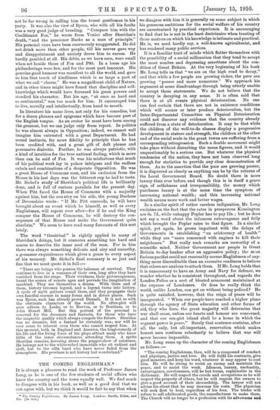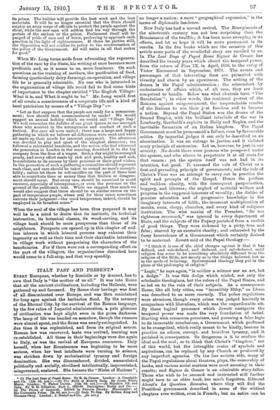THE COMING ENGLISHMAN *
IT is always a pleasure to read the work of Professor James Long, as he is one of the few students of social affairs who know the country and the town equally well. We find much to disagree with in his book, as well as a good deal that we can agree with, but we think it would be fair to say that when • The Coming Englishman. By James Long. London: Smith, Elder, and Co. [5e. net.]
we disagree with him it is generally on some subject in which his generous ambitions for the social welfare of his country are unrestrained by practical experience. It is encouraging to find that he is not in the least doctrinaire when treating of those matters on which his knowledge is intimate and practical.
He is, we need hardly say, a well-known agriculturist, and has rendered many public services.
It is a familiar trait of minds which flatter themselves with the possibility of a social millennium that they tend to accept the most sombre and depressing assertions about the con- dition of Great Britain. At the very beginning of his book Mr. Long tells us that " we are on the high road to decay," and that while a few people are growing richer, the poor are growing " poorer and more numerous." We approach his argument at some disadvantage through being utterly unable to accept these statements. We do not believe that the country is decaying in any sense. It is often said that there is at all events physical deterioration. No one can feel certain that there are not in existence conditions which will sooner or later produce deterioration, but the Inter-Departmental Committee on Physical Deterioration could not discover any evidence that the country already suffered from a state of deterioration. It may be that while the children of the well-to-do classes display a progressive development in stature and strength, the children at the other end of the social scale in the great towns are suffering from a corresponding retrogression. Such a double movement might take place without disturbing the mean figures, and it would unquestionably be a serious one. But whatever the physical tendencies of the nation, they have not been observed long enough for statistics to provide any clear demonstration of them. As to the assertion that the poor are growing poorer, it is disproved as clearly as anything can be by the returns of the Local Government Board. No doubt there is more luxury than ever before, and though this is in itself a grave sign of selfishness and irresponsibility, the money which purchases luxury is at the same time the symptom of increasing national wealth; and this increasing national wealth means more work and better wages.
In a similar spirit of rather careless indignation, Mr. Long exclaims on the fact that the rates in prosperous Kensington are 6s. 7d., while unhappy Poplar has to pay 12s. ; but he does not say a word about the infamous extravagance and folly which brought the Poplar rates to that figure. In a similar spirit, yet again, he grows impatient with the delays of Governments in establishing " an aristocracy of health " while they are "more concerned with engines to kill their neighbours." But really such remarks are unworthy of a scientific mind. Neither Government nor people in Great Britain to-day hanker after an aggressive policy ; the mist furious pacifist could not reasonably accuse Englishmen of any- thing more discreditable than an excessive readiness to believe that others are anxious to attack them. If Mr. Long holds that it is unnecessary to have an Army and Navy for defence, we wonder whether he is consistent throughout, and regards the London Police as a sort of bloated armament maintained at the expense of Londoners. Or does he really think the
world, unlike London, can get on without being policed ? He is quite satisfied, however, that the reign of peace will be inaugurated. " When our people have reached a higher plane through the agency of State education and other forms of aid, they who form the great majority will determine that war shall cease, unless our hearts and honour are concerned, and that our sea-girt island shall be a home in which the regnant power is peace." Surely that sentence contains, after
all, the only, but all-important, reservation which makes honest men continue reluctantly to believe that war will never become impossible.
Mr. Long sums up the character of the coming Englishman as follows :- " The coming Englishman, then, will be a compound of conduct and physique, justice and love. He will fulfil his contracts, give good measure, and keep his word, whatever it may appear to cost him. He will be strong to resist an enemy and maintain the peace, and to assist the weak. Idleness, luxury, unchastity, extravagance, covetousness, will be but terms, explainable in the dictionary. He will respect the creeds and occupations as he will respect the property of others, but he will require the owners to give a good account of their stewardship. The lawyer will not advise his client that he may increase his costs. The physician will seek first to heal, regardless of his fees. The trader will refuse to sell adulterated goods, the manufacturer to make them. The Church will no longer be a profession with its advowsona and
its prizes. The builder will provide the beat work and the best materials. It will be no longer essential that the State should employ an army corps of officials to protect the people against the cheat, while the new man will seldom find his way through the portals of the asylum or the prison. Parliament itself will be purged of pride of race and of brain, preferring to approach each question in the light of righteousness. If there be parties still, the Opposition will not confine its policy to the condemnation of the policy of the Government. All will unite in all that makes for good."
When Mr. Long turns aside from advocating the regenera- tion of the race by the State, his writing at once becomes more profitable and, as it seems to us, more luminous. On such questions as the training of mothers, the purification of food, farming (particularly dairy-farming), co-operation, and village life he is generally admirable. No one who is interested in the organisation of village life could fail to find some hints of importance in the chapter entitled "The English Village : What it is, and What it ought to be," Mr. Long would first of all create a consciousness of a corporate life and a kind of local patriotism by means of a " Village Day " " Let us first suppose that the people are ready for a commence- ment; how should that commencement be made? We would suggest an annual holiday which we would call `Village Day.' We well remember the Jubilee of our great Queen as one amongst those who assisted in the arrangement and conduct of such a festival. For once all were united ; there was a large and happy gathering in which we believe all differences were sunk and when all made up their minds for innocent enjoyment. The afternoon was devoted to play and sport of the simplest character • tea followed a substantial luncheon, and the writer, who had witnessed the procession in London in the morning, described it to the big company from the floor of a wagon. Such a day might be arranged yearly, and every effort made by rich and poor, healthy and sick, to contribute to its success by their presence or their good wishes. In the promotion of such a gathering a committee should represent each class, and care should be taken to wound no man's suscepti- bility ; rather let there be self-sacrifice on the part of those best able to contribute time or money than that friction or disagree- ment should occur. But every care should be exercised to avoid excesses, especially of intemperance, or even the presence on the ground of the publican's tent. While we suggest thus much we would also suggest that there should be no similar excess on tho part of temperance people, whose zeal for their cause sometimes outruns their judgment—the word temperance, indeed, should be employed in its broadest sense."
When the soul of the village has been thus prepared it may well be in a mind to desire that its institute, its technical instruction, its botanical classes, its wood-carving, and its village bank should be more prosperous than those of its
neighbours. Prospects are opened up in this chapter of end- less labours in which leisured persons may exhaust their ingenuity as well as their time and their charitable intentions in village work without pauperising the characters of the beneficiaries. For if there were not a corresponding effort on the part of the villagers, the organisations described here would come to a full-stop, and that very speedily.







































 Previous page
Previous page